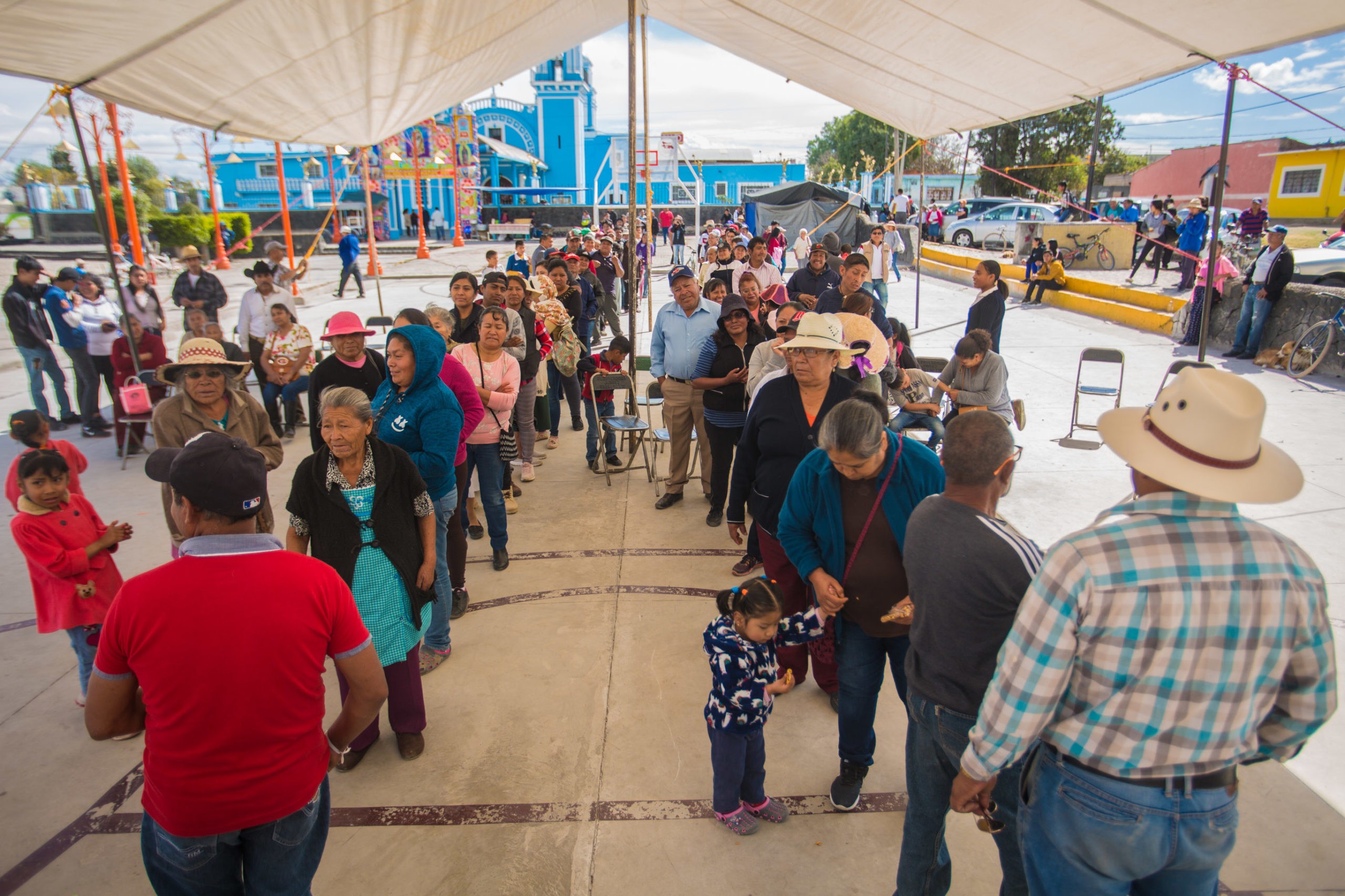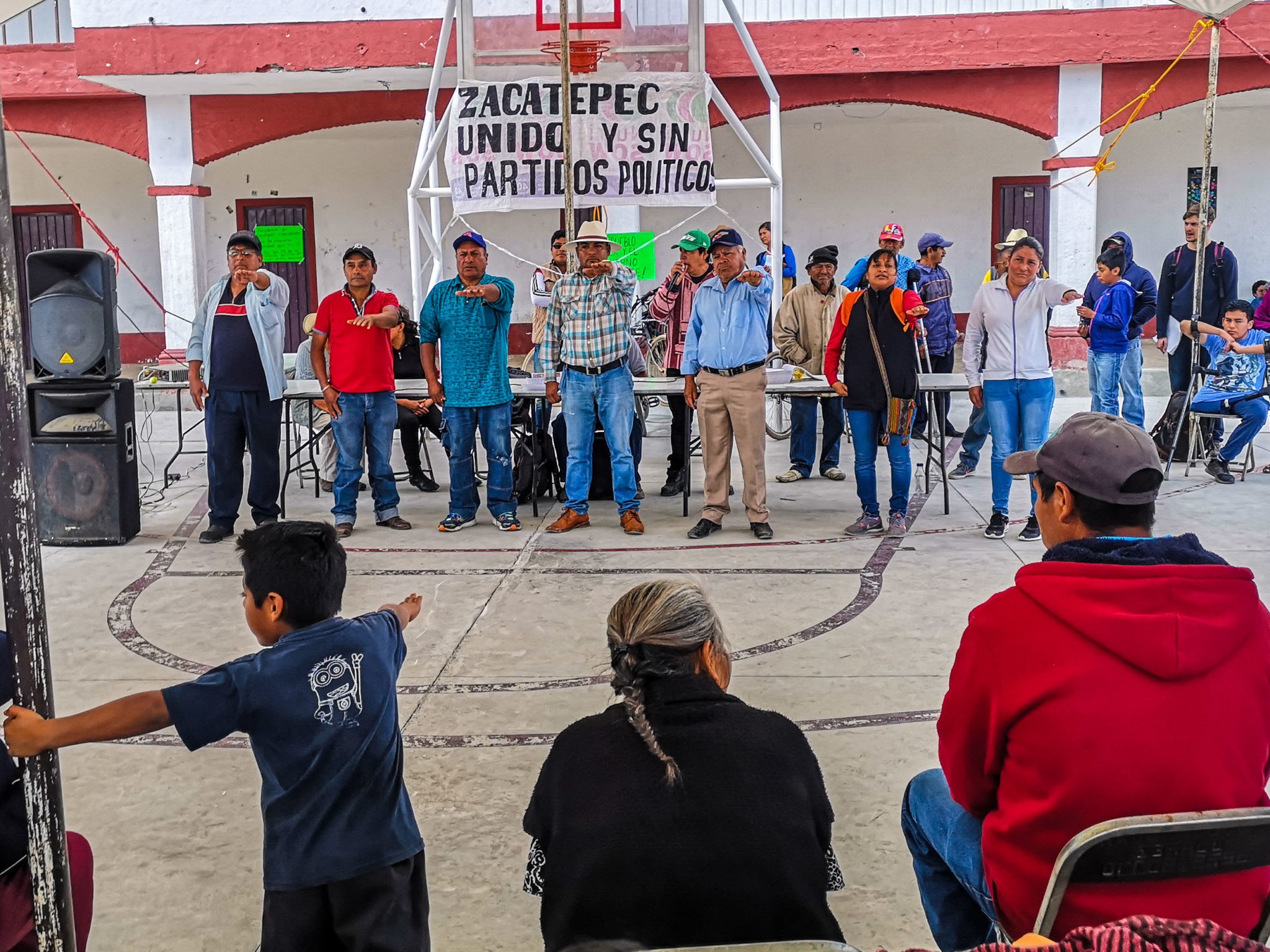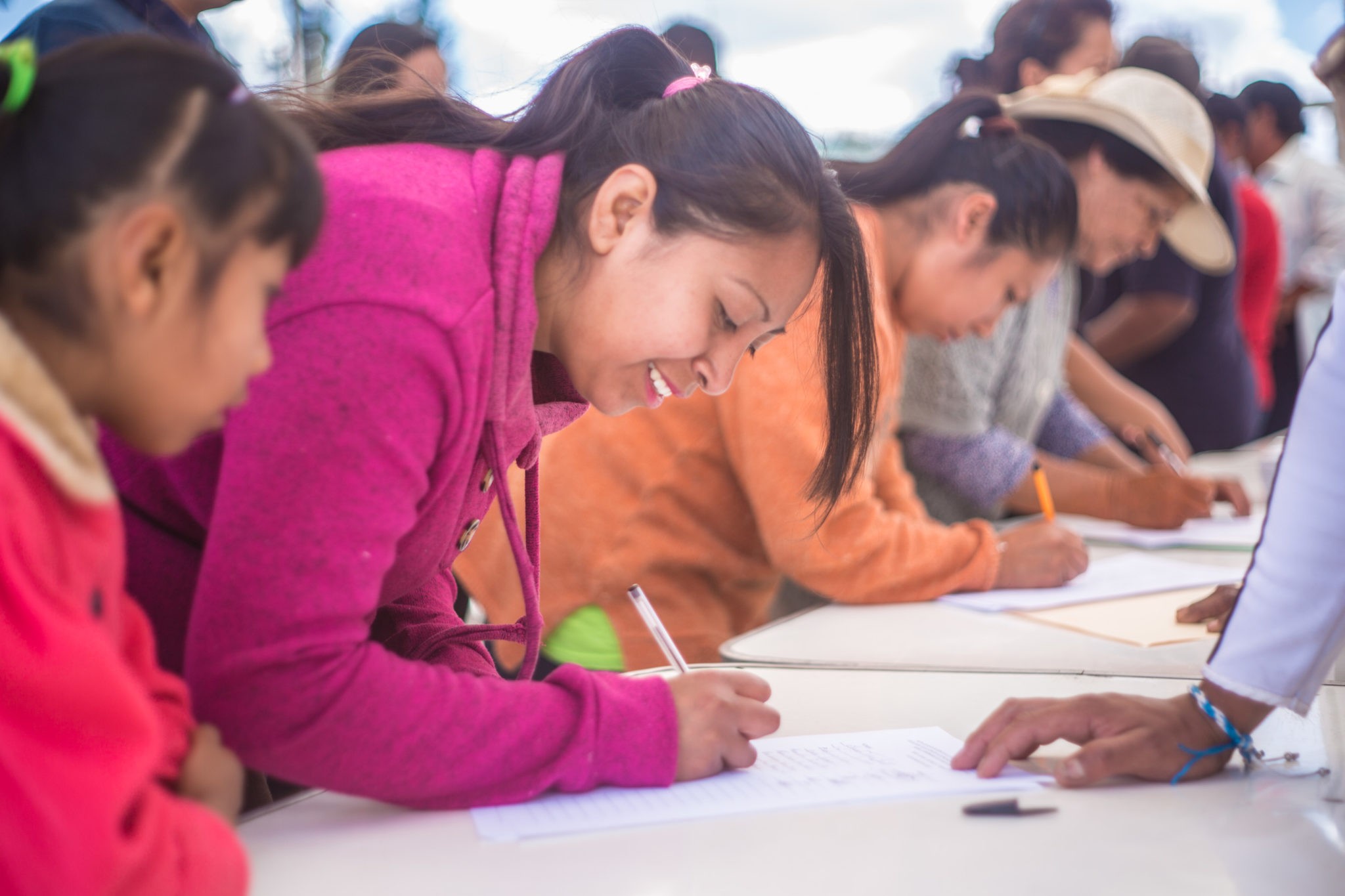Filed under: Action, Environment, Indigenous, Mexico

On January 19, the Indigenous Nahua community of Zacatepec, Puebla, removed its mayor and replaced him with a Council of Elders in response to his failure to stop a toxic drainage system that is part of the Mexican government’s neoliberal Morelos Integral Project. Shortly thereafter, on January 24, Miguel López Vega, the community’s representative to the National Indigenous Congress and its Indigenous Governing Council, was detained moments after delivering official notice of this action to the state government, setting off protests and highway blockades that won his release five days later. The following day, January 30, the municipal government temporarily suspended construction of the drainage system. The below article and photos by Daliri Oropeza for Pie de Página and translated by Scott Campbell documents the assembly to remove the mayor and create a self-government.
While forming lines, residents of the Nahua community of Santa María Zacatepec look at one another. They smile. They check who is in each line, which one is the longest.
Facing the threat of a toxic drainage system emptying into the Metlapanapa River, they have decided to practice self-determination and choose their own government according to their own internal system.
Accordingly, the person who has the most residents standing in their line will be one chosen to hold a community position.
At this Sunday’s assembly emerges an agreement that removes the current political authority, modifies the electoral system, and selects a Council of Elders made up of a mayor, a head of community security, and an assessor, responsible for the administration of resources.
The call for the assembly was public and open. Observers attended from other communities in the Juan C. Bonilla municipality and from the Human Rights Commission.
“It had to come to this point because we’re tired of the parties and politicians. People have come from the PAN, the PRD, the Green Party, the PRI, MORENA. We believed in them; they offered us the stars. I was one of their voters, but we realized in time that we were voting for our own destruction. They weren’t looking out for us, nor what we asked of them, such as to reject the toxic drainage into our river. They gave priority to and took care of the businesspeople, not us,” says José Leovido Nicolás Cinto Tepale, elected as the mayor with the longest line behind him.

Zacatepec’s new Council of Elders is sworn in.
Historic Assembly
It seemed like not many people would come. It was scheduled for 10am in the main square. But little by little, as the sound was adjusted, the families began arriving.
Several older women were already seated in chairs in the center of the basketball court, under a tarp covering them from the sun and rain. On the backboard was a banner: “Zacatepec united and without political parties.”
At the start of the assembly, around 10:30am, the area around the tarp was full.
The moderator read that the agreement for the revocation of authority, modification of the electoral system, and election of authorities according the internal normative system of the Indigenous town of Santa María Zacatepec was based on Article 1, section A, and Articles 4 and 9 of the Constitution.
He said that in order to choose, there should be a discussion among the people present. He asked those who had proposals to share them. He explained that they were going to elect a Council of Elders and that those at the assembly should decide if there were enough people present to make that decision.
The moderator, who is a broadcaster on Radio Zacatepec, also said that they would have to elect the Council’s substitutes.
“The community is very worried and feels repressed because it sees that the Textile City business owners and the three levels of government want to impose by force two sanitary and storm sewage and drainage systems onto our community drainage system and the Metlapanapa River,” he read.
“Maurilio Teutle Huelic did not want to represent us appropriately,” the mocking can be heard in the distance. The women comment to one another about the callousness of the mayor they just removed.
“Who do you nominate?” says the moderator. Now there are more people under and around the tarp. It turns into a commotion and after discussing it out loud, three men remain up front, nominated for the position of mayor.
“Begin to line up in front of the person you believe can best carry out the position,” the moderator has the microphone, encouraging people to stand up. The people look at one another and discreetly walk with shortened steps, thinking about who to stand in front of.
Others are more decisive and quickly place themselves in front of the person they think is the best representative. With the majority, the community forms the longest line in front of José Leovido Nicolás Cinto Tepale.
Members of the community kept an eye on the process. Anyone from the outside, including journalists, was asked to tell the truth about what was happening.
The registry of the assembly contained the names and signatures of 244 attendees, enough to validate the community assembly as agreed.
Every time they elect a new person for a position, there is applause.
The community leaves behind the electoral system of ballot boxes to reclaim what they documented as their original way of practicing governance since before colonial times.

Residents of Zacatepec sign the agreement modifying the election system and electing a Council of Elders.
Rights on the line
“The people are realizing that there exists this way of governing ourselves according to our old ways, like our grandparents did. It’s something very good because it does away with jealousy and selfishness. Barriers are removed and it doesn’t matter if your brother is in the other line, voting for a different representative than the one you’re voting for. There will be no reprisals, unlike what happens under political party rule, where they buy your vote with housing materials, they slander you, or they threaten you,” says Mari Torres, a Nahua broadcaster with Radio Zacatepec.
She describes her own experience of this process of self-determination happening today, agreeing with the other attendees who said, “This is historic.”
Using colonial archives carrying the royal seal, members of the town’s community radio station showed that they are an Indigenous community that existed since before the colonial invasion. The archives describe the organization of their government and it composed of the same positions that were chosen in today’s assembly. This document was approved by a federal judge.
Zacatepec’s exercise in self-determination may have constitutional standing if considered an expression of the collective right of Indigenous peoples as defined in ILO Convention 169.
“We saw the need to resume our form of governance as it was done by our elders. This drainage project is not for us, there are no guarantees, it doesn’t benefit us, it doesn’t generate employment, nothing. It only threatens the life of the river,” says Cinto Tepale.
The self-determination of peoples
According to researcher and lawyer Francisco López Bárcenas, the right to self-determination of peoples involves recognition of their own character and ability to provide for their existence and future.
In this assembly, the community of Zacatepec exercised the right of self-affirmation, the ability of a people to proclaim itself as existing, of having an “ethnic consciousness,” says López Bárcenas.
In turn, with the right to self-definition, the people determine who constitutes the people.
In an interview, Cinto Tepale says, “I promised to determine our territorial boundaries,” as the first act upon assuming the position to which he had just been elected. That is another indispensable part of self-determination: the right to of a people to determine the boundaries of their territory.
With this assembly, the community of Zacatepec sees the beginning of a new stage in their right to self-organization, which is the right of the entire people to organize itself in the manner it chooses. “Its internal power translates into its power to determine its political status and collective future, together with the rest of the population and the state to which it belongs,” López Bárcenas describes in his book Autonomies and Indigenous Rights in Mexico.
The assembly ended with the chant: “The people, united, will never be defeated.”
“It’s important to demonstrate to the authorities that we can defend the river, that they are not going to discourage us or scare us by sending in police or their National Guard. They are not going to stop us. We’re going to rise up with more energy, and we’re going to support those that we just elected. We are going to be with them to serve as an example for other communities. United we’re going to do something together for our municipality so it adopts Indigenous ways of governing,” says Mari Torres of Radio Zacatepec.
“I invite affected communities to take back their Indigenous forms governance, because we can’t rely on the authorities, they turn their backs on us and only they know if it’s because of economic or politic interests. It doesn’t matter because we are not going to let them violate our rights,” proclaims the mayor they have just elected.





